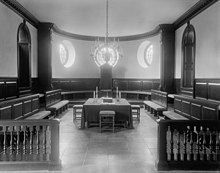House of Burgesses
| The Virginia House of Burgesses | |
|---|---|
| Colony of Virginia | |

Patrick Henry in the House of Burgesses by Peter F. Rothermel
|
|
| History | |
| Established | 1619 |
| Succeeded by | Virginia House of Delegates in 1776 |
| Meeting place | |
 |
|
| Reconstructed chamber in Williamsburg Jamestown, Virginia (1619–1699) Williamsburg, Virginia (1699–1776) |
|
The Virginia House of Burgesses /ˈbɜːrdʒəsɪz/ was the first legislative assembly of elected representatives in North America. The House was established by the Virginia Company, which created the body as part of an effort to encourage English craftsmen to settle in North America, and to make conditions in the colony more agreeable for its current inhabitants.
From 1619 to 1776, the representative branch of the legislature of Virginia was the House of Burgesses, which governed in conjunction with a colonial governor and his council. Jamestown remained the capital of the Virginia colony until 1699, when the government was moved to Williamsburg. In 1776 the colony became the independent Commonwealth of Virginia and the House of Burgesses became the House of Delegates.
Originally a synonym of or bourgeois, the word "burgess" came to mean a borough representative in local or parliamentary government.
The Colony of Virginia was founded by an English stock company, the Virginia Company, as a private venture, though under a royal charter. Early governors provided the stern leadership and harsh judgments required for the colony to survive its early difficulties. As early crises with famine, disease, Native American attacks, the need to establish a cash crop and insufficient skilled or committed labor subsided, the colony needed to attract enough new and responsible settlers if it was to grow and prosper.
To encourage settlers to come to Virginia, in 1618–1619, the Virginia Company's leaders drew up a great charter. Emigrants who paid their own way to Virginia would receive fifty acres of land. They would not be mere tenants. Civil authority would control the military. A council of burgesses, representatives chosen by the inhabitants of the colony for their government, would be convened as the House of Burgesses. The governor could veto their actions and the company still had overall control of the venture, but the settlers would have a say in their own government, including the right of the House of Burgesses to introduce money bills. The House of Assembly was created at the same time in Bermuda (which had also been settled by the Virginia Company, and was by then managed by its offshoot, the Somers Isles Company) and held its first session in 1620.
...
Wikipedia
